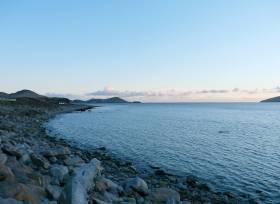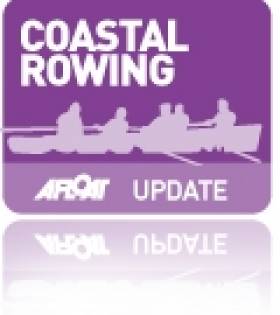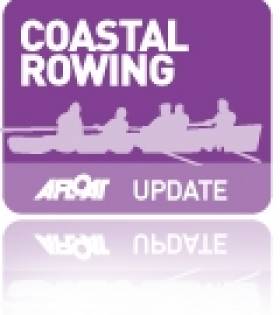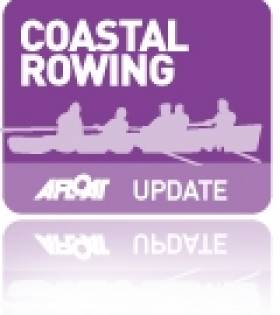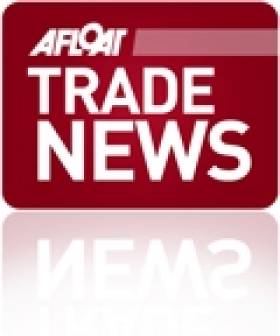Displaying items by tag: Waterville
Inland Fisheries Ireland (IFI) has issued a reminder to anglers that the Conservation of Sea Trout (No.7 or Kerry District) Waterville Area Bye-Law No 971 of 2019 remains in effect.
This bye-law prohibits the retention and possession of any sea trout (Salmo trutta L.) taken by any fishing engine or by rod and line in the Waterville area, ie that part of the sea eastward of a line drawn from the most westerly point of Bolus Head to the most westerly point of Lamb’s Head and to all the waters discharging in to it.
The Bye-Law mainly affects sea trout fishing on:
- the river Inny (Knockmoyle) and its tributaries;
- the waters of the Waterville system, including the Waterville River, Lough Currane, the Cummeragh River and all their tributary rivers and lakes; and
- the waters of Ballinskelligs Bay.
For further information please visit www.fisheriesireland.ie.
‘Brown Tags’ Regulations Coming Into Force for Salmon Anglers in Kerry’s Waterville Catchment
Anglers who wish to catch and keep wild salmon from the Waterville catchment in 2022 are being advised that ‘brown tag’ regulations to boost conservation efforts are coming into force from Monday 17 January.
The measures are included in the Wild Salmon and Sea Trout Tagging Scheme (Amendment) Regulations, recently signed into law by the Minister for the Environment, Climate and Communications, Eamon Ryan.
Under brown tag regulations, an angler who wishes to ‘harvest’ a wild salmon and keep it must attach a brown tag as well as a standard blue tag to the fish.
To help conserve stocks of wild salmon within the Waterville catchment, a total of 64 brown tags will be available for the season to anglers with a 2022 rod licence through a lottery system.
Three draws are set to take place in 2022 and these will be held on Monday 10 January (to allocate 24 brown tags), Monday 28 February (to allocate 20 brown tags; applications will be open 14-25 February) and finally on Monday 28 March (to allocate the remaining 20 brown tags; applications will be open 14-25 March).
Anglers may only fish one brown tag over the full season, and multiple applications will disqualify.
Meanwhile, anglers with a 2022 rod licence who are not allocated a brown tag are only permitted to fish for salmon on a ‘catch and release’ basis in the Waterville catchment, where the salmon is returned safely to the same waterbody.
The brown tag regulations come into force on the Waterville catchment from Monday 17 January and will remain in place until midnight on Thursday 12 May.
Any anglers that are interested in entering the January draw are being asked to email their request to [email protected] up to midnight on Friday 7 January, providing their name, contact address and phone number and quoting their 2022 Salmon Licence number.
Further details are available by phoning Inland Fisheries Ireland’s Macroom office on (026) 41221.
Waterville Locals & Business Invited To Info Event On Opportunities In Angling Tourism
#Tourism - Waterville Lakes and Rivers Trust is hosting an information event on opportunities in angling tourism for business owners and the public in Waterville and surrounding areas later this month.
The event, which takes place at The Sea Lodge in Waterville, Co Kerry on Thursday 27 April at 7.30pm, will focus on sharing results from a recent economic survey carried out in Waterville among angling tourists to the area.
The research reveals some key opportunities for business and service providers in the locality.
The Waterville Anglers Survey queried 207 anglers visiting the area and found that on average, angling visitors spend €644 per fishing trip, or €114 per day.
The impact of this expenditure is far reaching across the local community, with €451 spent on non-angling items such as accommodation, restaurants/cafés and groceries, and €193 of angling expenditure on items such as angling guides, boat hire and equipment.
This daily spend of anglers in Waterville (€114) far exceeds the spending of non-angling visitors to Ireland. Fáilte Ireland’s Tourism Facts Report 2015 cites expenditure of non-angling visitors and holiday makers at €68 and €89 respectively per person per day in 2015.
The research, which was carried out by Inland Fisheries Ireland with Waterville Lakes and River Trust, highlights the significant recreational and economic value of the fisheries resource to the area.
Rod Robinson, spokesperson for Waterville Lakes and Trust, said: “Waterville is a popular destination for anglers and this research shows us the huge economic contribution they make to Waterville and the potential opportunity which exists for the community.
“We are inviting the public, business owners and tourist operators to come along and hear more so that together we can grow our offering around the fisheries amenity.”
Suzanne Campion, head of business development at Inland Fisheries Ireland, added: “We know at a national level that the fisheries resource contributes €836 million to the Irish economy annually but this local research also tells us that there is significant value of angling tourists to this community.
“We also note that the research once more confirms that angling visitors spend more than non-angling tourists and that they visit outside of the traditional tourist season, supporting local businesses and jobs while doing so.”
The information event is open to all to attend. For more details, contact Rod Robinson at Waterville Lakes and Trust via email at [email protected].
#coastalrowing – The Coastal Rowing Clubs of Kerry played host to this year's All Ireland Coastal Rowing Championships which took place on Lough Currane, Waterville, Co Kerry, at the weekend from Friday, 15th to Sunday 17th August 2014 writes Valerie O'Sullivan.
More than 2700 rowers competed, in the picturesque village of Waterville, which lies on the Iveragh Peninsula, 530 crews raced for medals and trophies in the most coveted of Rowing Championships. Crews from Donegal, Antrim, Belfast, Dublin, Wicklow, Wexford, Cork, and Kerry competed at the weekend.The type of boat used in the Coastal Rowing Championships is called a 'One Design' - fibre glass boat, fixed seat, a crew of four and cox.
Though the sun was shining, the breezes were stiff, just like the competition, the course was flawless, designed by Nick Norris, Schull, Co Cork, a great friend of Waterville Rowing Club, overseeing all the course was Kerry Coastal Chairman, Pat Cuffe and volunteer Andrew Wharton, who were seen, cutting branches, fixing engines, making tea, cleaning up the rubbish! Waterville Rowing Club's Noel Clifford and team were on hand for every element of the rowing weekend.
Speaking after the event, PRO Mary B Teahan, commented "What we witnessed in Waterville was a wonderful weekend of rowing, the atmosphere was amazing, the fun and comradarie incredible. Medals were hard to come by, every crew gave it there all. We've been working on the event for a year, and all the hard work definitely paid off, Waterville was the perfect location, every community in South and Mid Kerry were completely behind the event. The Organisation was enormous, and thankfully it ran very smoothly"
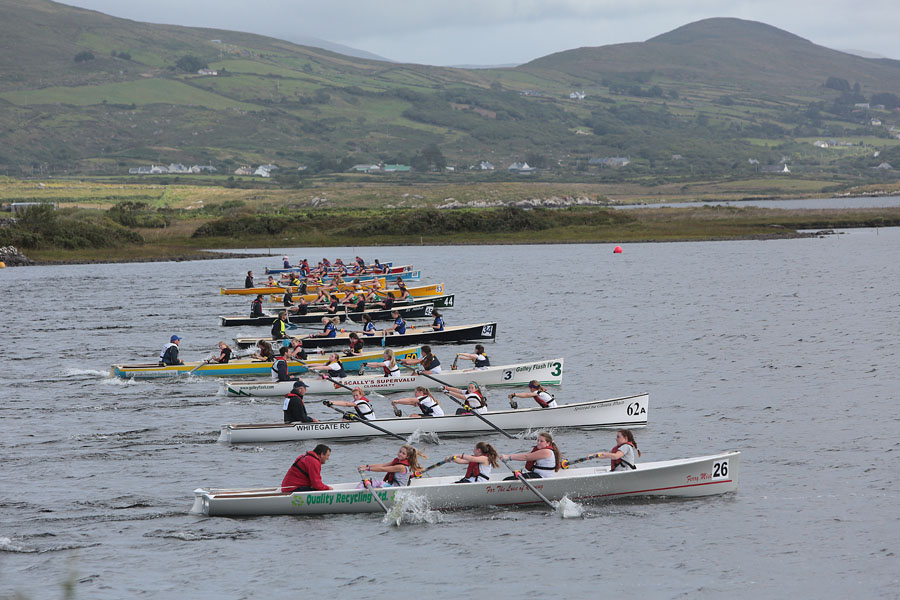
All Ireland coastal rowing racing at Waterville. Photo: Valerie O'Sullivan. Scroll down for a gallery of photos
As Afloat reported previously, taking the honours for the Senior Men's Race was Killorglin Rowing Club, the crew took an early lead and just couldn't be taken, Cork Rivals Courtmacsherry and Kilmacsimon RC finishing 2nd and 3rd in what is always the biggest race of the day.
Not to be outdone the Senior Ladies was won by Killorglin Rowing Club, 2nd another great Kerry Club, Sneem RC and in 3rd place was Arklow RC.
Results of the All Ireland Coastal Rowing Championships 2014
Senior Men's Race: Winners: Killorglin Rowing Club A
2nd Courtmacsherry Rowing Club
3rd Kilmacsimon Rowing Club
Junior Men's Race: Winners: Ring Rowing Club
2nd Passage West Rowing Club
3rd Kilmacsimon Rowing Club
Intermediate Men's Race Winners: Cahirciveen Rowing Club
2nd Whitegate Rowing Club
3rd Portmagee Rowing Club
Senior Ladies Race Winners: Killorglin Rowing Club
2nd Sneem Rowing Club
3rd Arklow Rowing Club
Junior Ladies Race Winners: Galley Flash Rowing Club
2nd Arklow Rowing Club
3rd Courtmacsherry Rowing Club
Intermediate Ladies Race Winners: Passage West Rowing Club
2nd Whitegate Rowing Club
3rd East Ferry Rowing Club
Mixed Veteran Crew Winners: Portmagee Rowing Club
2nd Myross Rowing Club
3rd Templenoe B Rowing Club
Under 14 Girls Crew Winners : Whitegate Rowing Club A
2nd Ring Rowing Club
joint 2nd Templenoe Rowng Club
Under 16's Boys Winners: Killorglin Rowing Club
2nd Kilmacsimon Rowing Club
3rd Sive Rowing Club
Under 18 Ladies Winners; Sneem Rowing Club
2nd Fossa Rowing Club
3rd Valentia Rowing Club
Pre-Vet Men Winners: Killorglin B Rowing Club
2nd Courtmacsherry Rowing Club
3rd Whitegate Rowing Club
U 12's Winners: Galley Flash Rowing Club
2nd Passage West Rowing Club
3rd Myross Rowing Club
U18's Winners: Passage West Rowing Club
2nd Killorglin Rowing Club
3rd Galley Flash Rowing Club
U18's Ladies Winners: Sneem Rowing Club
2nd Fossa Rowing Club
3rd Valentia Rowing Club
U16 Girls Winners: Kilmacsimon Rowing Club
2nd Myross Rowing Club
3rd Caherdaniel Rowing Club
U16's Winners: Killorglin Rowing Club
2nd Kilmacsimon Rowing Club
3rd Sive Rowing Club
Under 14 Winners: Cairndhu Rowing Club
2nd Courtmacsherry Rowing Club
3rd Killorglin Rowing Club
Under 21 Ladies Winners: Killorglin Rowing Club
2nd Ring Rowing Club
3rd Fossa Rowing Club
Under 21 Winners: Whitegate Rowing Club
2nd Templenoe Rowing Club
3rd Galley Flash Rowing Club
U12 Girls Winners: Portmagee Rowing Club
2nd Passage West Rowing Club
3rd Sive Rowing Club
Master Ladies Winners: Kilmacsimon Rowing Club
Masters Men Winners: Templenoe Rowing Club
Veteran Men Winners: Portmagee Rowing Club
Veteran Ladies Winners: Whitegate Rowing Club
Senior Mixed Winners: Killorglin Rowing Club
Pre Veteran Mixed Winners: Callinafercy Rowing Club
Pre Veteran Ladies Winners: Arklow Rowing Club
Pre Veteran Men WInners: Killorglin B Rowing Club
Mixed Veterans Winners: Portmagee Rowing Club
FISA Singles Ladies Winner Melanie Hunt Kilmacsimon
FISA Single Mens Winner Cormac Kelly Arklow
Seine Boat Winners: Valentia Island (A) Dermot Walsh
Open Classic Ladies Winners: Myross Rowing Club
Open Classic Men Winners: Myross Rowing Club
Cork Yawl Ladies Winners: Whitegate Rowing Club
Cork Yawl Men Winners: Whitegate Rowing Club
Heritage Race Ladies Winners: Sneem Rowing Club
Heritage Race Men Winners: St Patrick's (A)
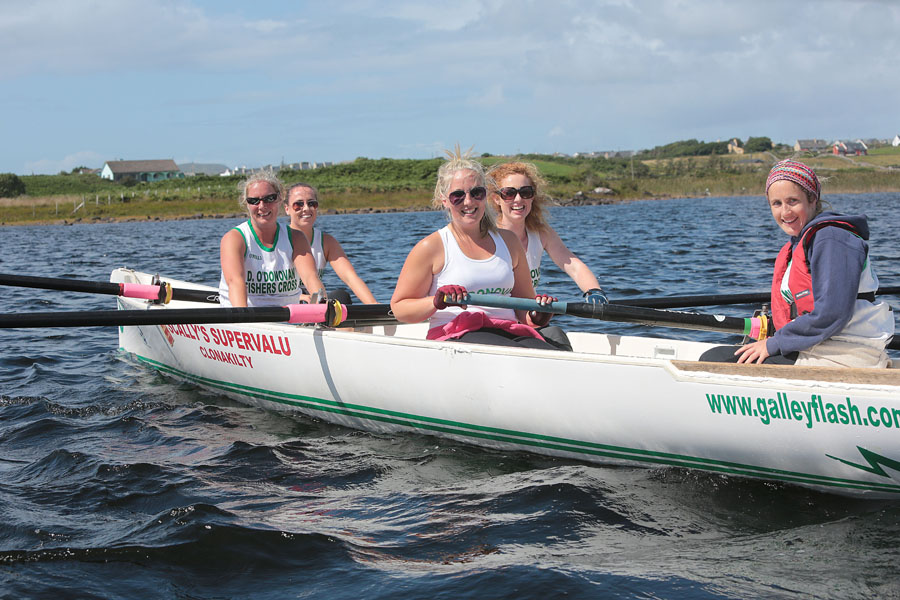
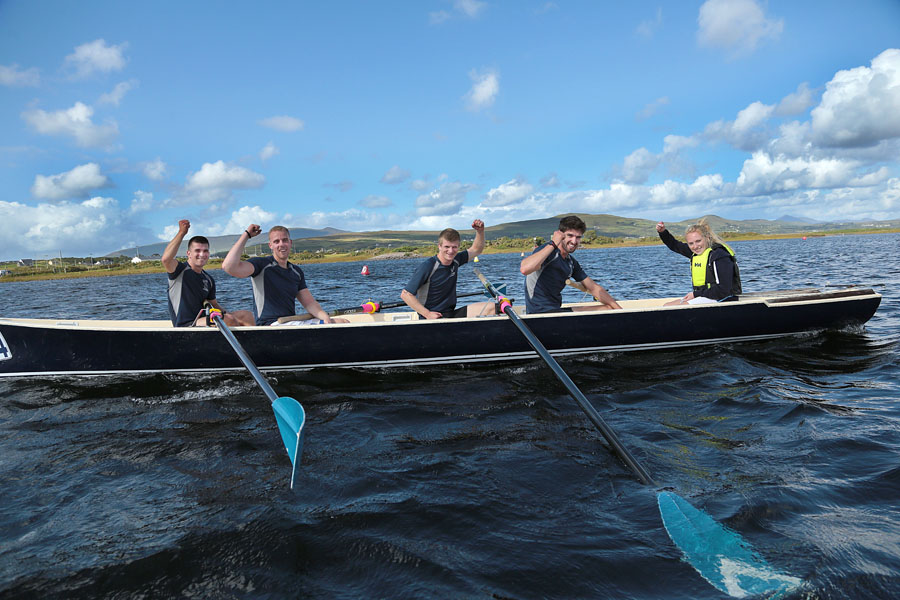
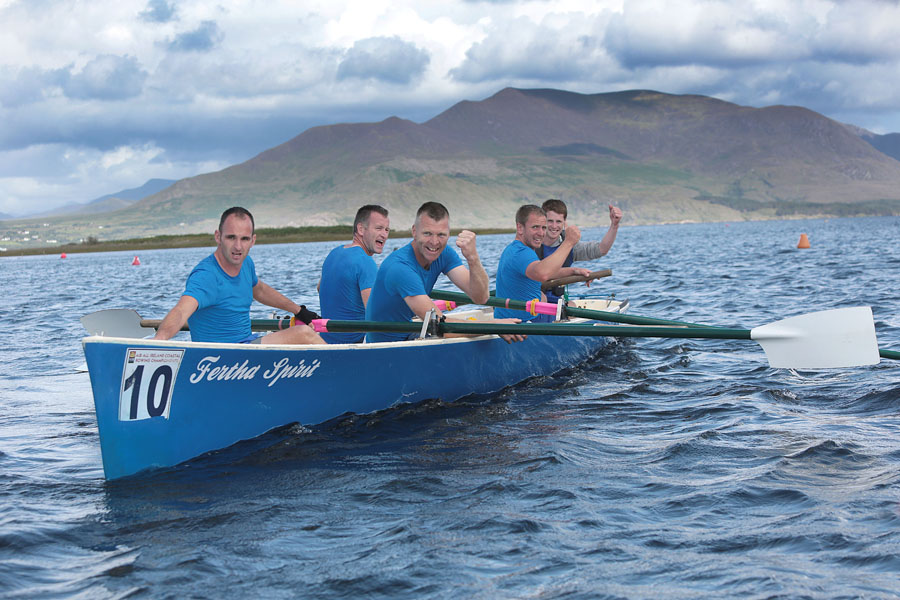
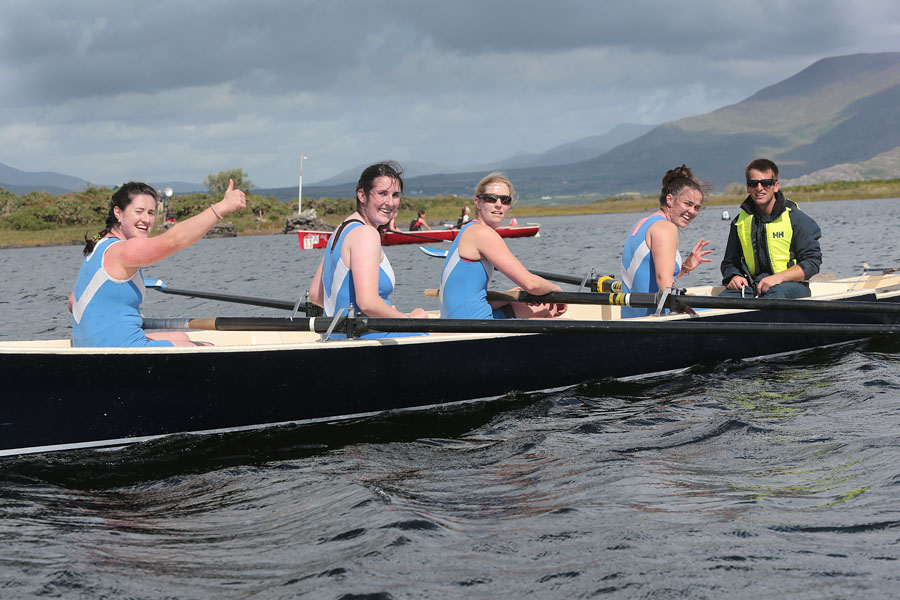
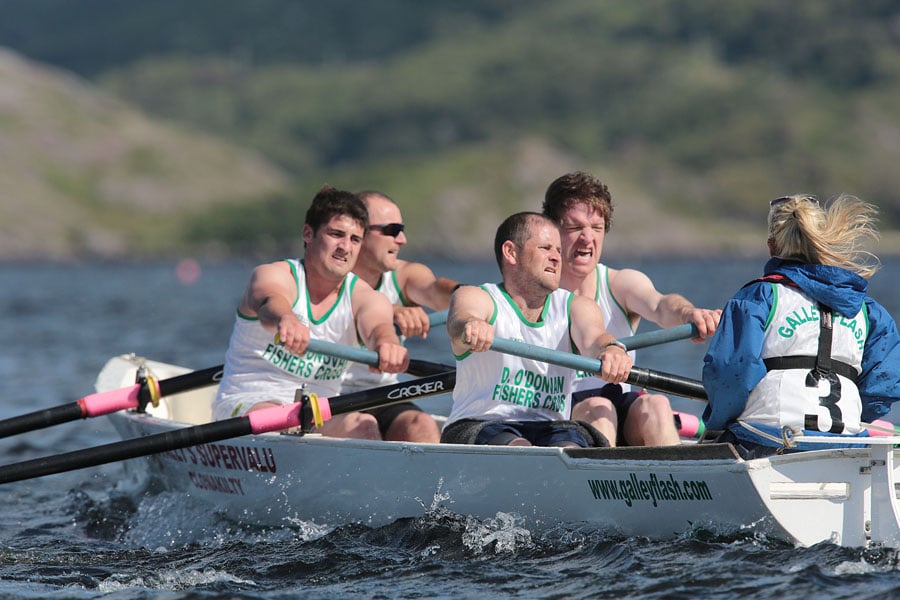
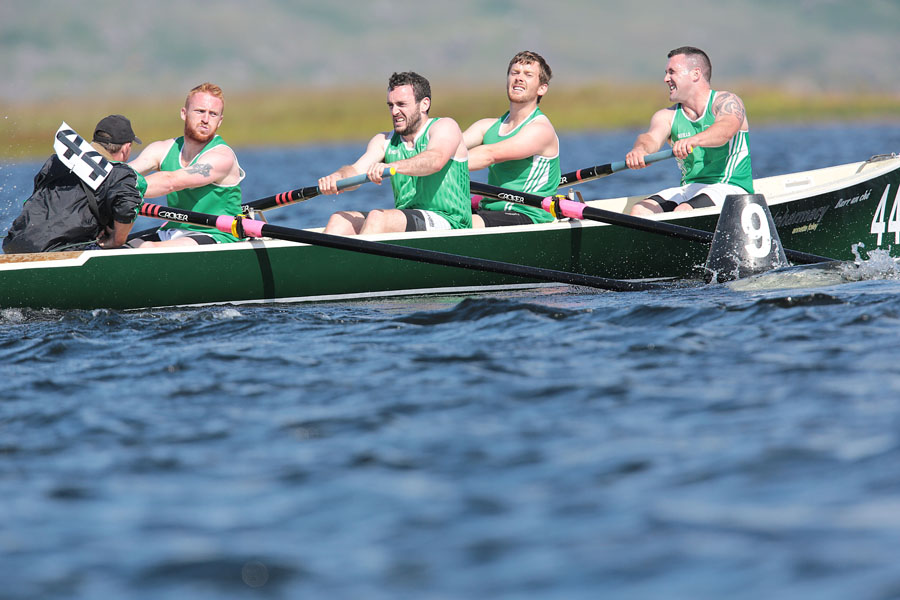
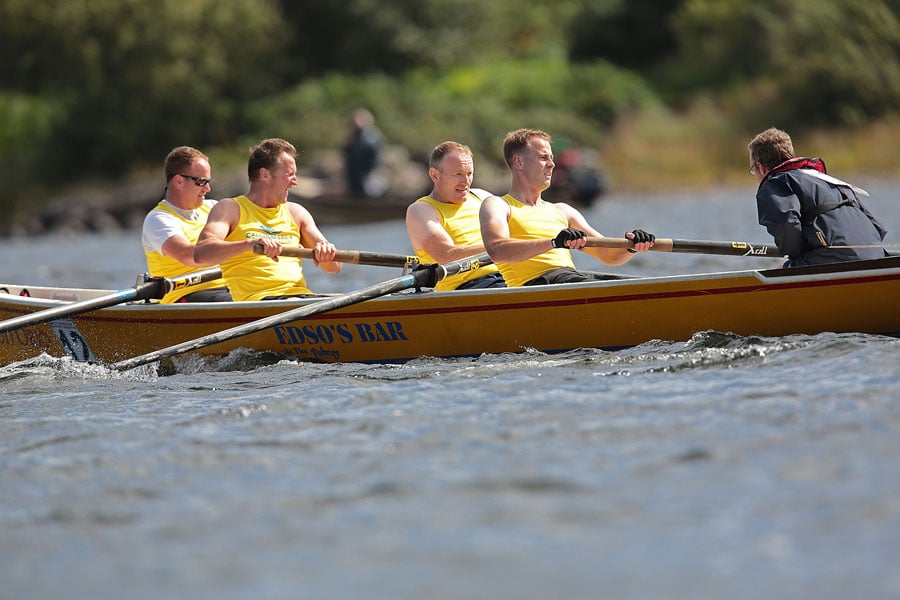
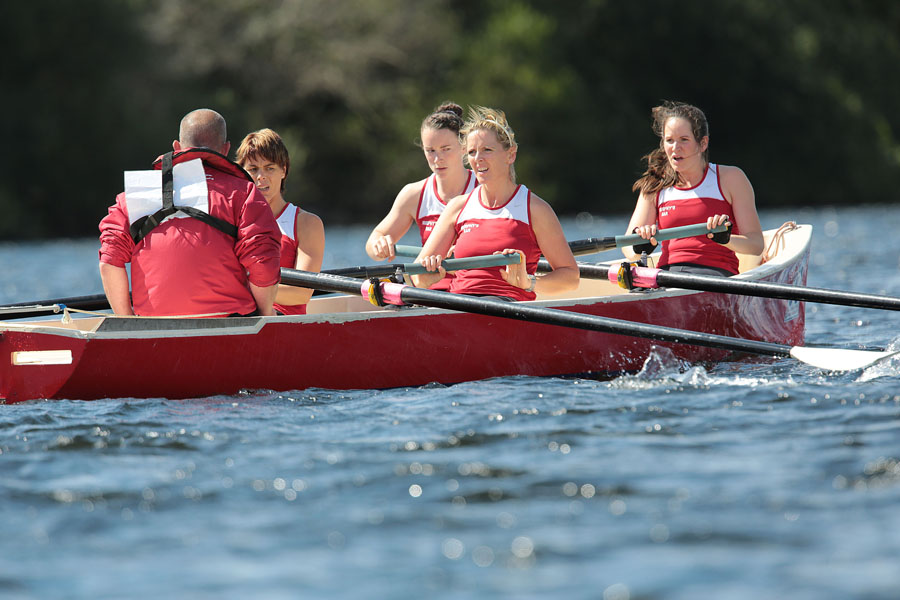
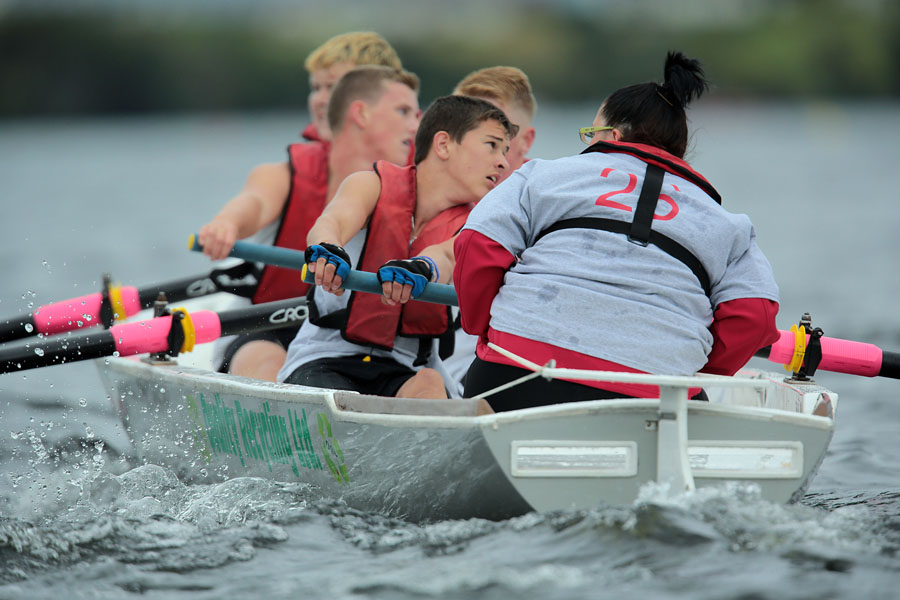
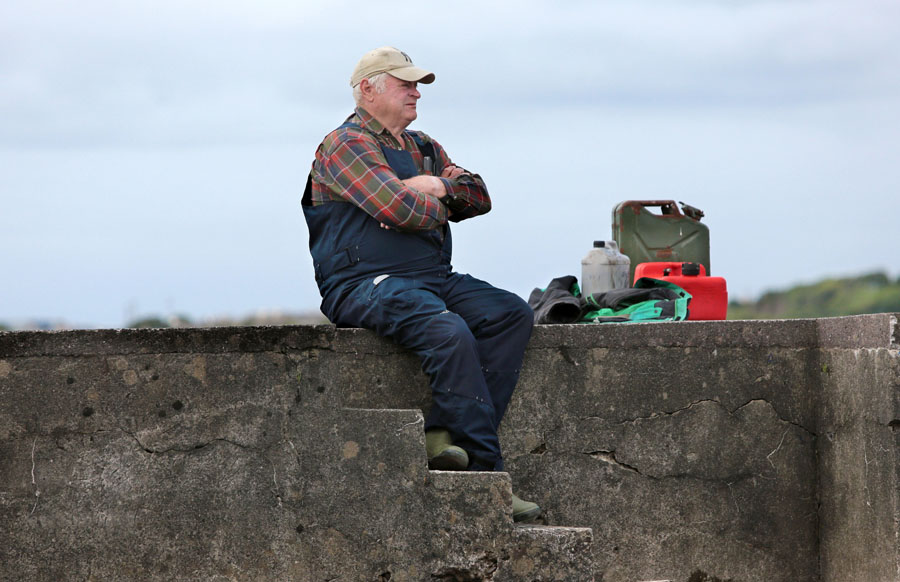
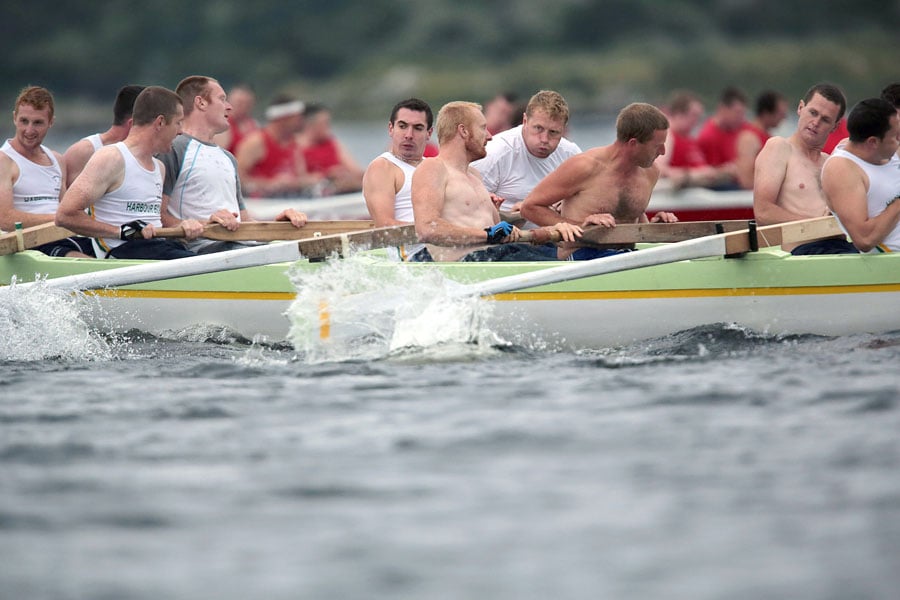
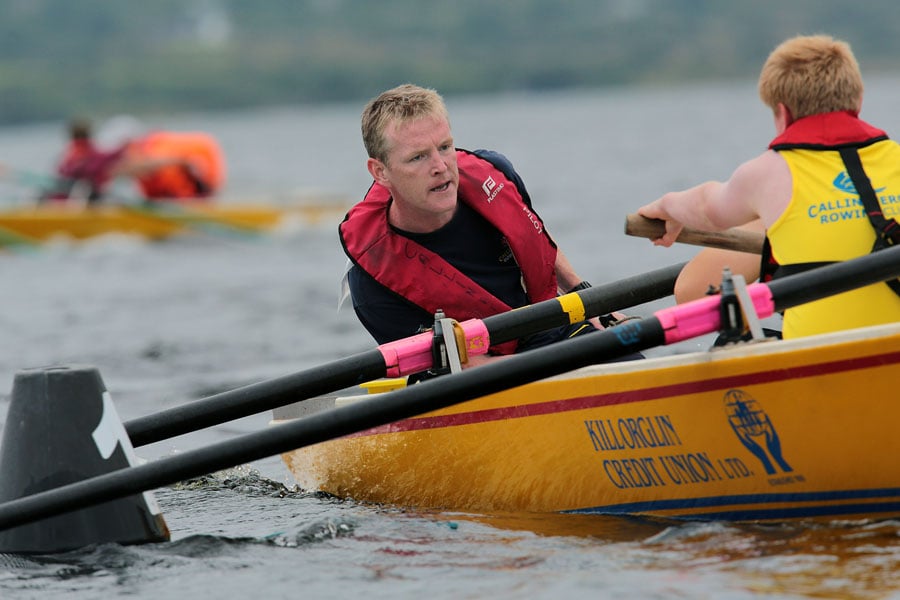
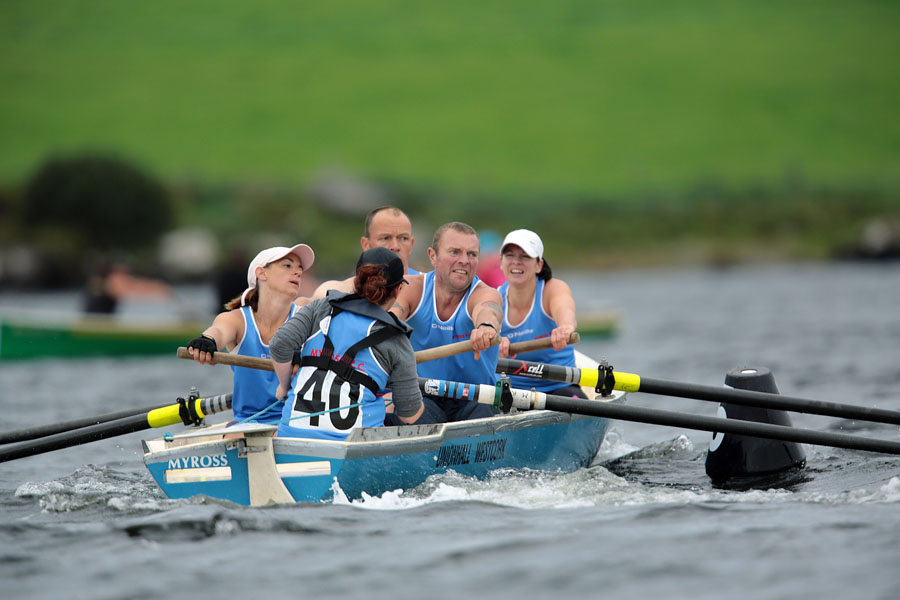
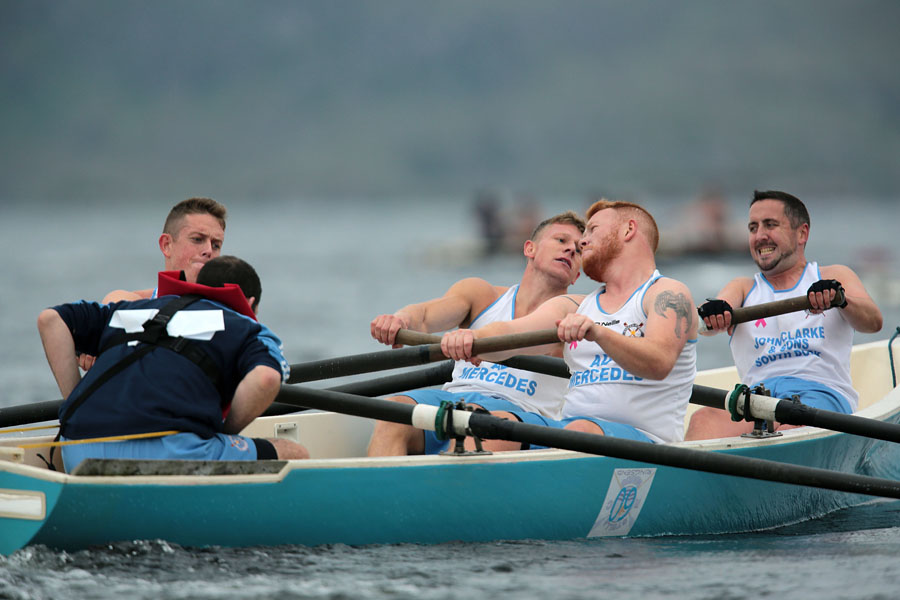
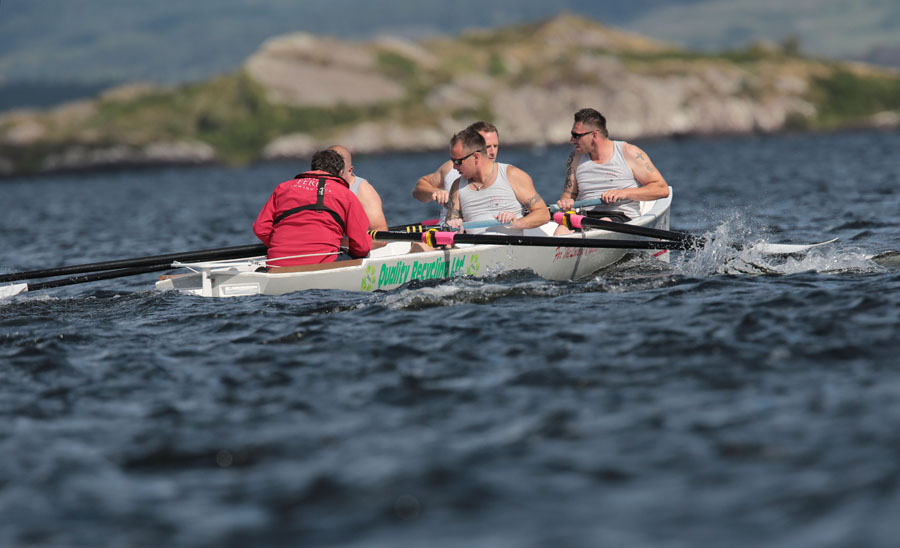
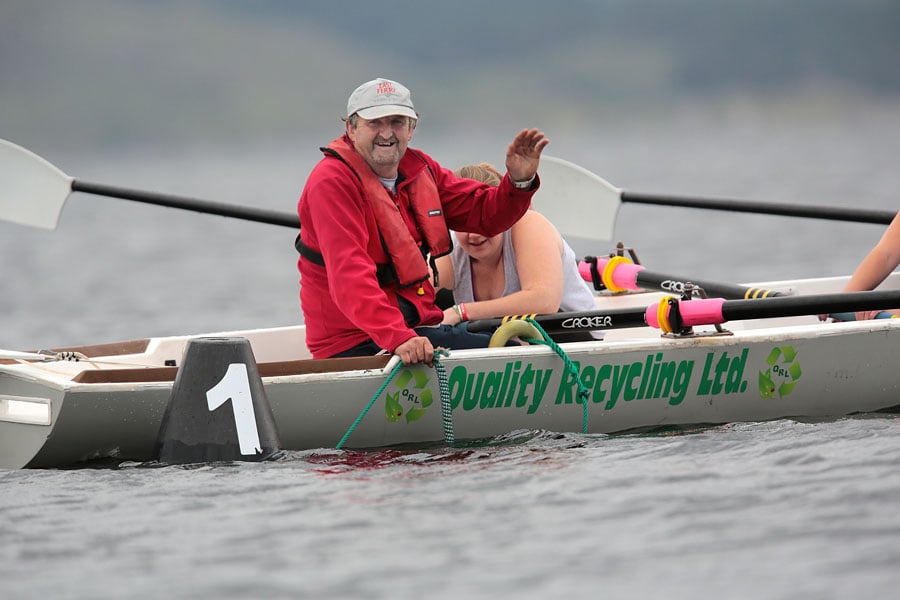
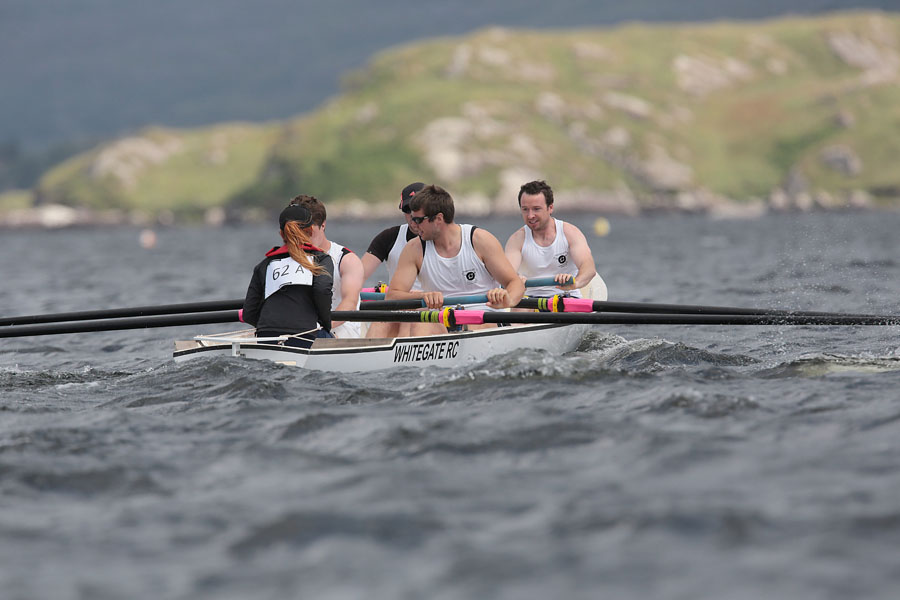
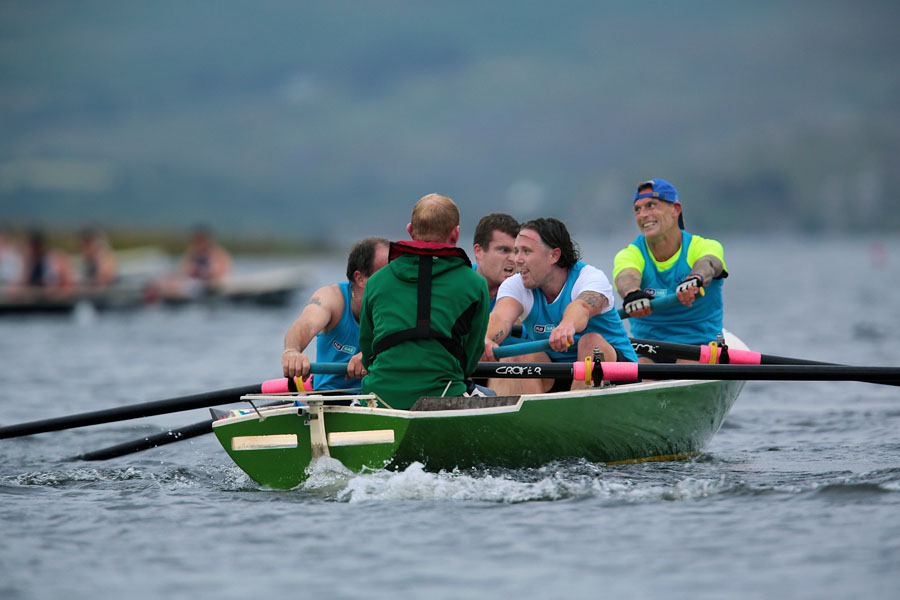
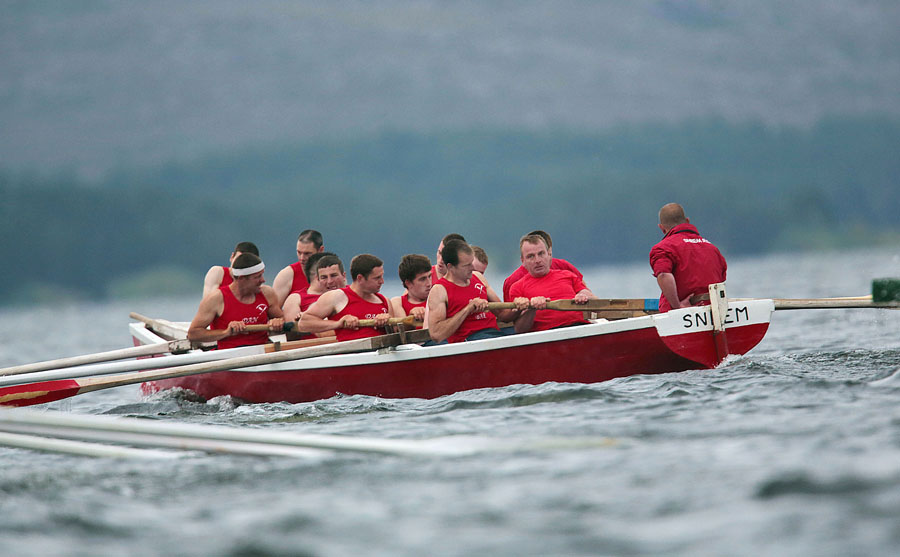
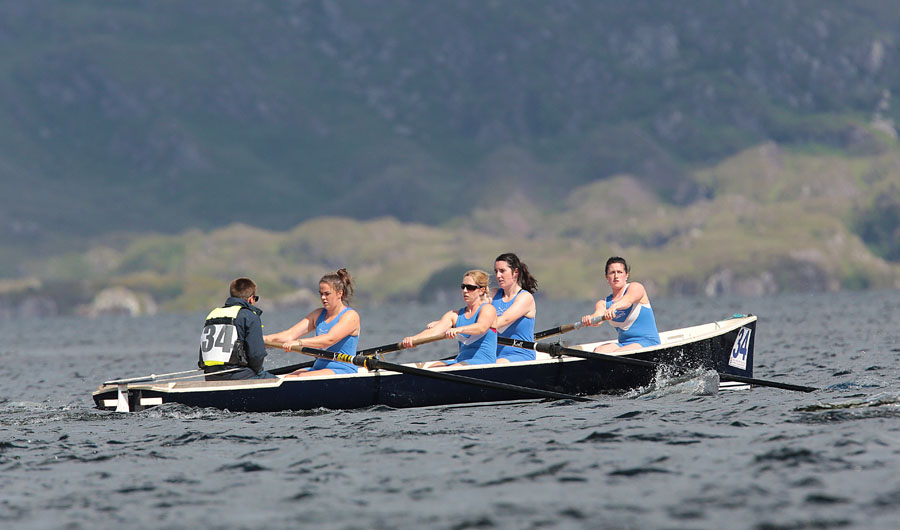
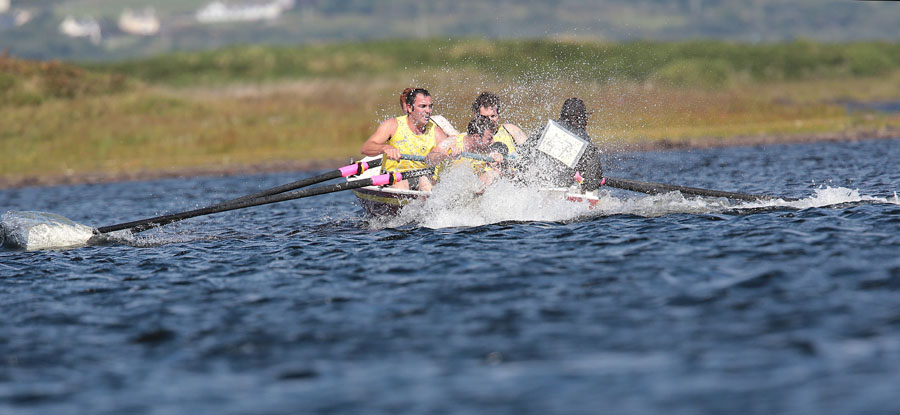
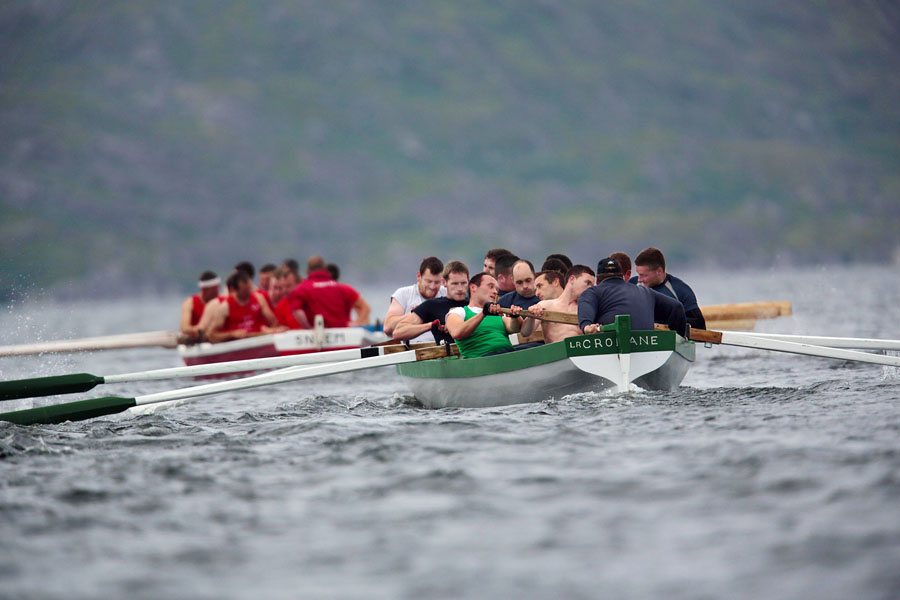
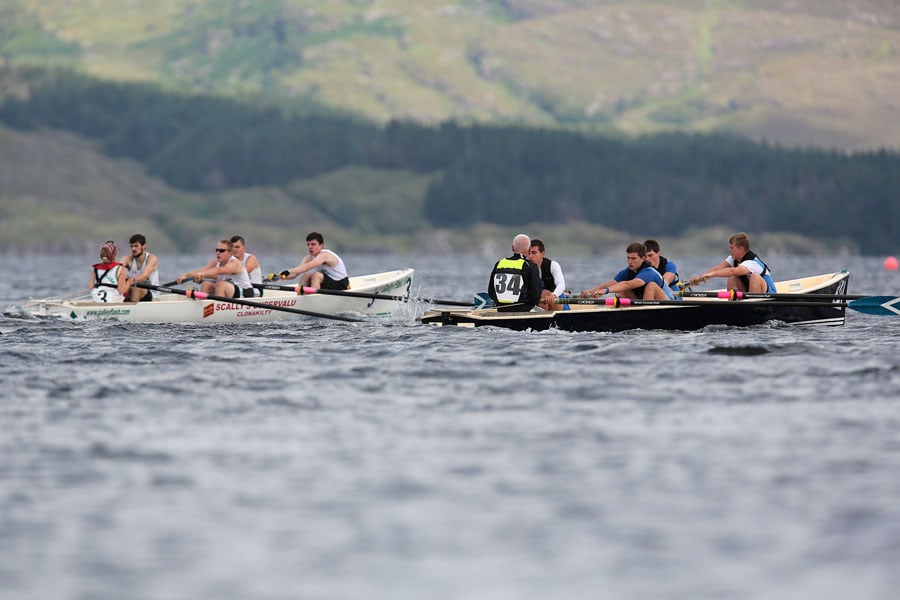
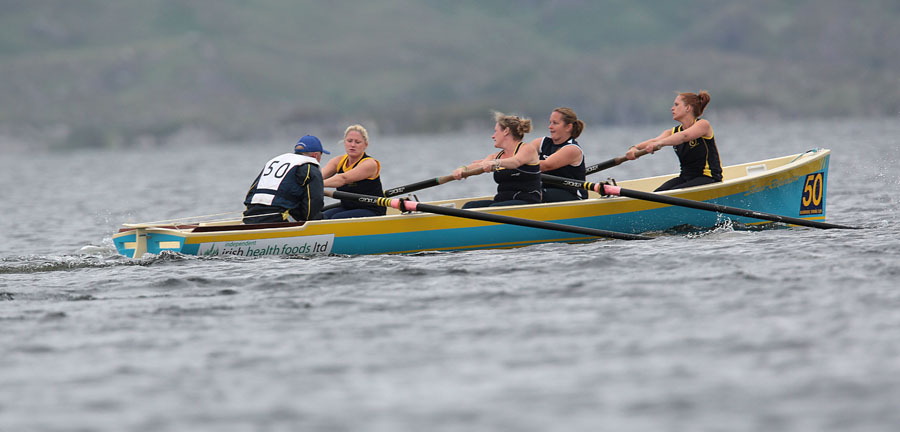
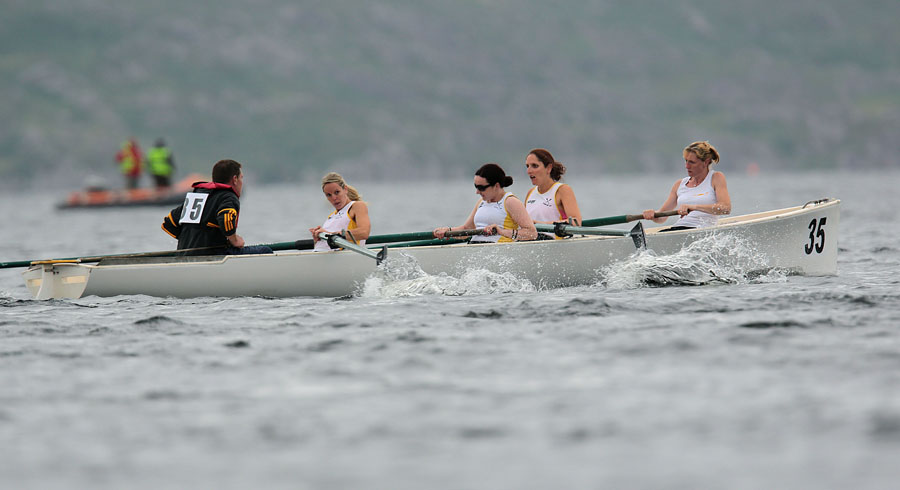
All photos by Valerie O'Sullivan
Killorglin Rowing Club Excel at Irish Coastal Rowing Championships
#COASTAL ROWING: Killorglin won the final event of the day, the men’s four, at an Irish Coastal Rowing Championships which were blessed by good conditions at Lough Currane, Waterville, County Kerry. The blue riband event had gone to Cork clubs for the last four years, but Killorglin’s crew of Cathal Clifford, Cian Clifford, Seán Deignan and stroke Fionnán Crowley brought it back to the host county. Killorglin’s women’s four – stroked by Aileen Crowley – also won.
The award for Sporting Club of the Day went to Carnlough of Antrim, while Ring from Cork had taken the title of best overall junior club, and Cairndhu the best adult club.
Irish Coastal Rowing Championships, Waterville, Kerry (Selected Results, Finals Winners)
Men
Senior: Killorglin. Intermediate: Caherciveen. Junior: Ring. Under-21: Whitegate. Under-18: Passage West. Under-16: Killorglin.
Veterans: Portmagee. Pre-Vet: Fossa.
Women
Senior: Killorglin. Intermediate: Passage West. Junior: Galley Flash.
Under-21: Killorglin. Under-18: Sneem. Under-16: Kilmacsimon.
Veterans: Myross. Pre-Vet: Arklow.
Mixed
Senior: Killorglin. Veterans: Portmagee. Pre-Vet: Portmagee.
Coastal Rowing Championships Promise Weekend of Action and Fun
#COASTAL ROWING: The All Ireland Coastal Rowing Championships will take place on Lough Currane, Waterville, Co Kerry, this weekend. About 2,700 rowers will descent on the picturesque village of Waterville, which lies on the Iveragh Peninsula, with 530 crews competing for a medal and a trophy. The action starts today (Friday) at 4pm.
The Kerry Coastal Rowing Association hosts the event. There are over 20 coastal rowing clubs, involved in organising the extensive programme of rowing and entertainment. There are a 25 categories of rowing, from the Under 12s to Master/Veteran.
Mary B Teahan, the PRO of the Irish Coastal Rowing Federation, said: “This regatta is the biggest regatta in the country and promises to be full of passion, pride and fantastic competition, where the best in the country will come to take on the might of each other. It’s a celebration of rowing. Crews from Donegal, Antrim, Belfast, Dublin, Wicklow, Wexford, Cork, and Kerry, will battle it out on the water and be assured of best of Kerry craic during the event. It’s also a showcase of what this part of the Iveragh Peninsula has to offer, in terms of tourism and promotion of the Wild Atlantic Way ... it ticks all the boxes.”
The event begins with a blessing of the boats, today at 4pm … Then the real rowing action begins.
Teahan said: “The opening ceremony promises to be a taste of Kerry. a lot of effort and time been put in to prepare for this prestigious event with the coastal rowing clubs, fund raising throughout the winter. The board has driven the preparations forward with the local rowing clubs and GAA in Waterville all helping out for the weekend. There is nightly entertainment in the green in the village with an array of bands and music and our nominated charity kindly stewarding.”
The event charity is Recovery Haven cancer services.
Forty heats will be rowed on Saturday. The finals take place on Sunday. The organisers say the atmosphere will be like Croke Park on All-Ireland final day: club colours worn with pride, club support out in force, the intense rivalry, the referee’s decision, the photo finish, the factions, club picnics, and maybe the old splash of rain!
The type of boat used in the Coastal Rowing Championships is called a ‘One Design’ – a fibre glass boat, fixed seat, a crew of four and cox. Another fine showcase to watch out for is The Seine boat crews of Mid and South Kerry where a 12-man crew, with a cox, races 18 kilometres.
Three Opportunities for Lakeside Living
#WATERFRONT PROPERTY - The Irish Times features a selection of serene lakeside properties to suit a variety of tastes and budgets.
Urrahill in Ballycommon, Nenagh, Co Tipperary is a detached home overlooking Luska Bay and Lough Derg and comprising three levels.
The upper level features living rooms and a kitchen with large windows and stunning views. The middle level has four bedrooms, with the main en-suite on the lowest floor with sliding doors to a private terrace.
Colliers International is asking €1.5 million for this ultra-modern property.
Meanwhile in Kerry, a four-bed country house on 1.5 acres is less than a mile from Waterville yet features its own pier with boathouse on Lough Currane, known for its salmon and trout angling.
The house has central heating throughout, oak flooring, a lounge with its own wood-burning stove, a fully fitted kitchen, car garage and utility shed. Kerry Property Services is asking €580,000.
Last but not least, those looking to renovate would surely be attracted to Eden Point in Rossinver, Co Leitrim, a two-bed, two-bathroom detached home on the shores of Lough Melvin.
Eden Point boasts "hundreds of metres" of foreshore, as well as a boat house and quay, and included in the sale is a share in the Rossinver Fishery Sundicate (worth €5,000) which allows free use of the Rossinver Fishery. Fermanagh Lakeland Properties is asking €250,000.
Safari Boats Order Boosts Kerry Boat Building Firm
Kerry Boat-builder O'Sullivan's Marine (OSM) is bucking the trend in the depressed marine industry. The Tralee firm have a busy order book and report strong demand for its traditional lake boat marque but it also has interest in more exotic boats too for the emerging nature tourism market.
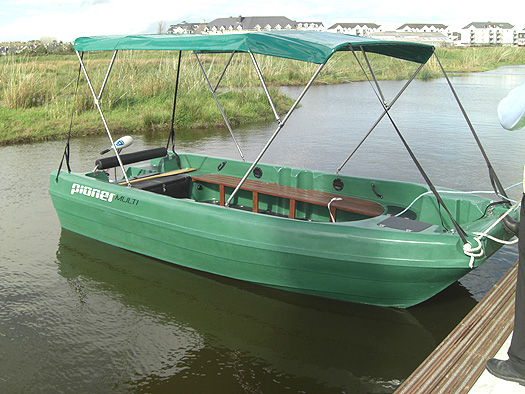
Tried and tested, the new Safari boats are ready for Lee Valley
The first of the orders processed in Tralee is the supply of four Pioner Multi boats with Motor Guide 24v Electric Outboards for the local Lee Valley Development, a new eight hectare (20 acre) eco-tourism development comprising a Nature Park. The four boats will be used for safari-style boat rides.
'We carried out water trials yesterday, all is in order and the fully fitted out boats are being delivered this week', says managing director Brian O'Sullivan.
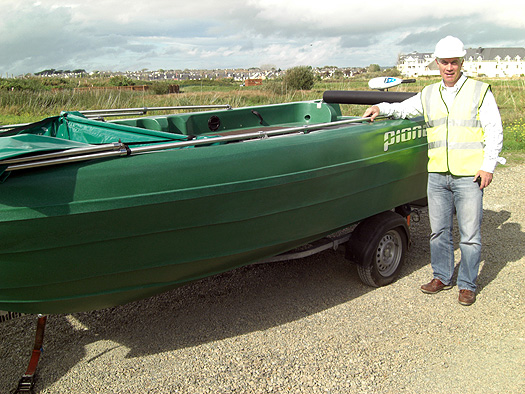
OSM's Brian O'Sullivan with one of the new Pioner boats
OSM, a member of the Irish Marine Federation, is also supplying two lake boats to Creeslough Angling Association in Donegal. Six Irish built boats have also been ordered by Dunfanaghy Angling Association in Donegal. Five more lake boats are also going to Waterville, Co. Kerry. All orders are for November delivery! Recession? What recession?
OSM have a selection of used craft on the boats for sale website. See them here


























